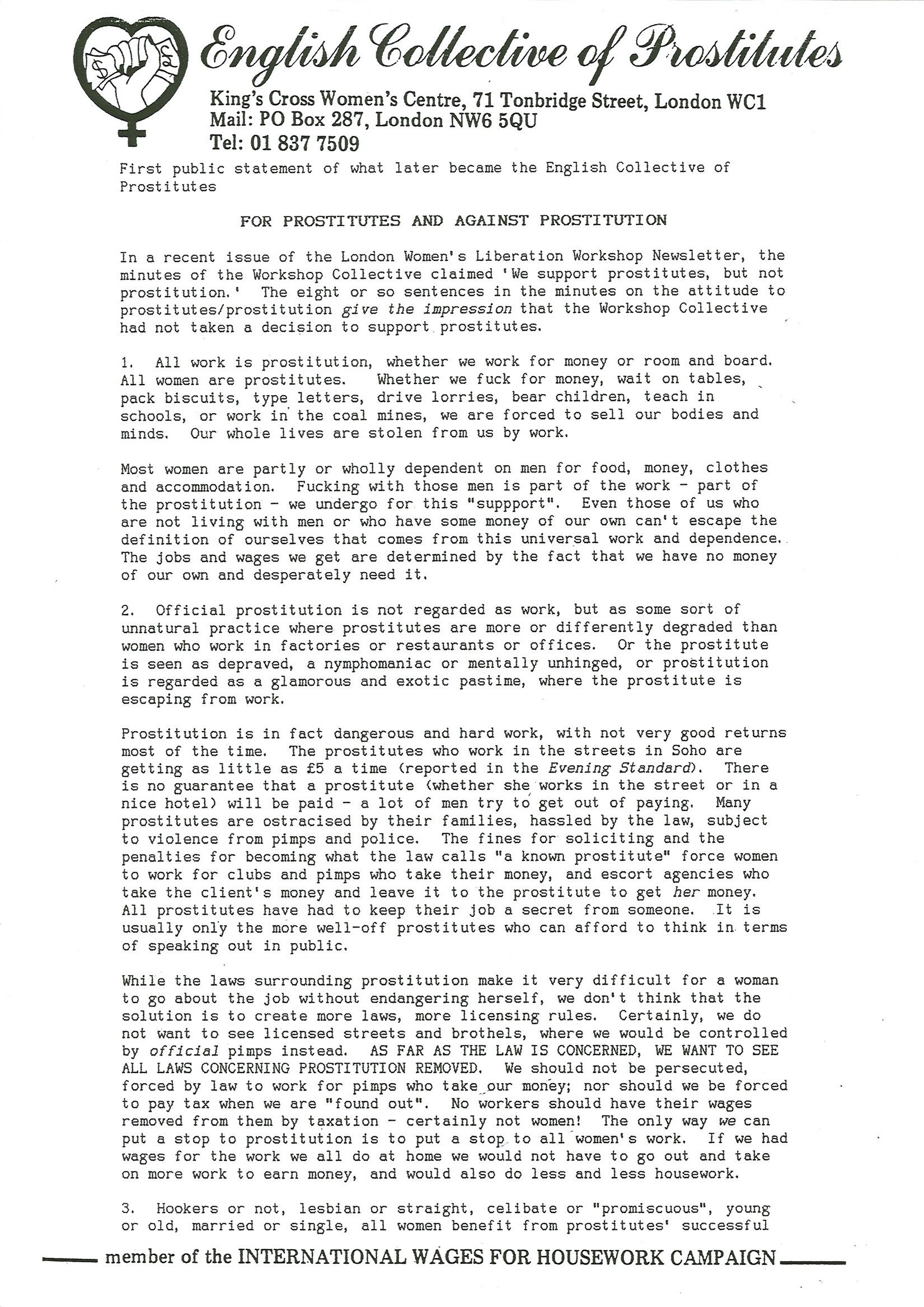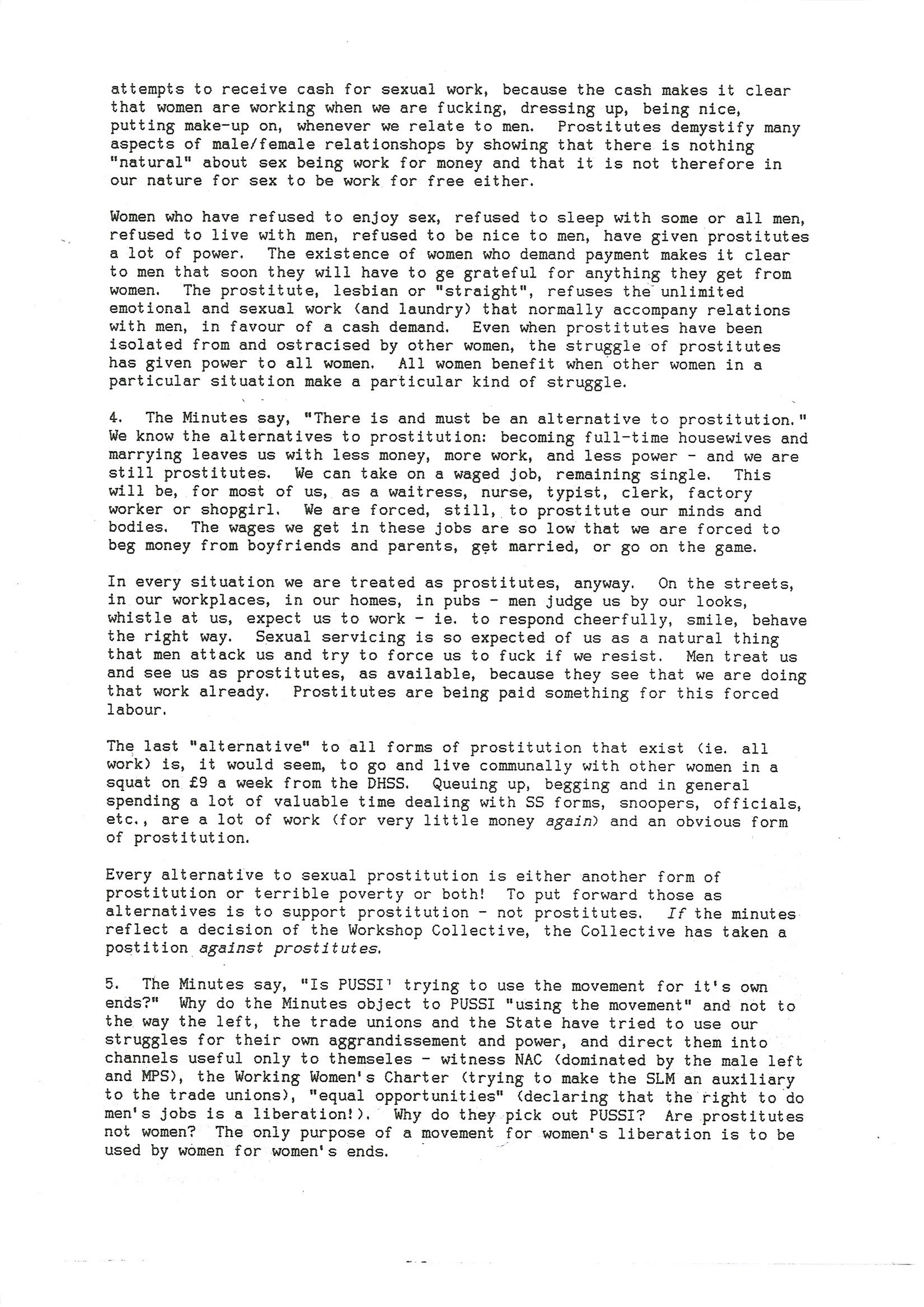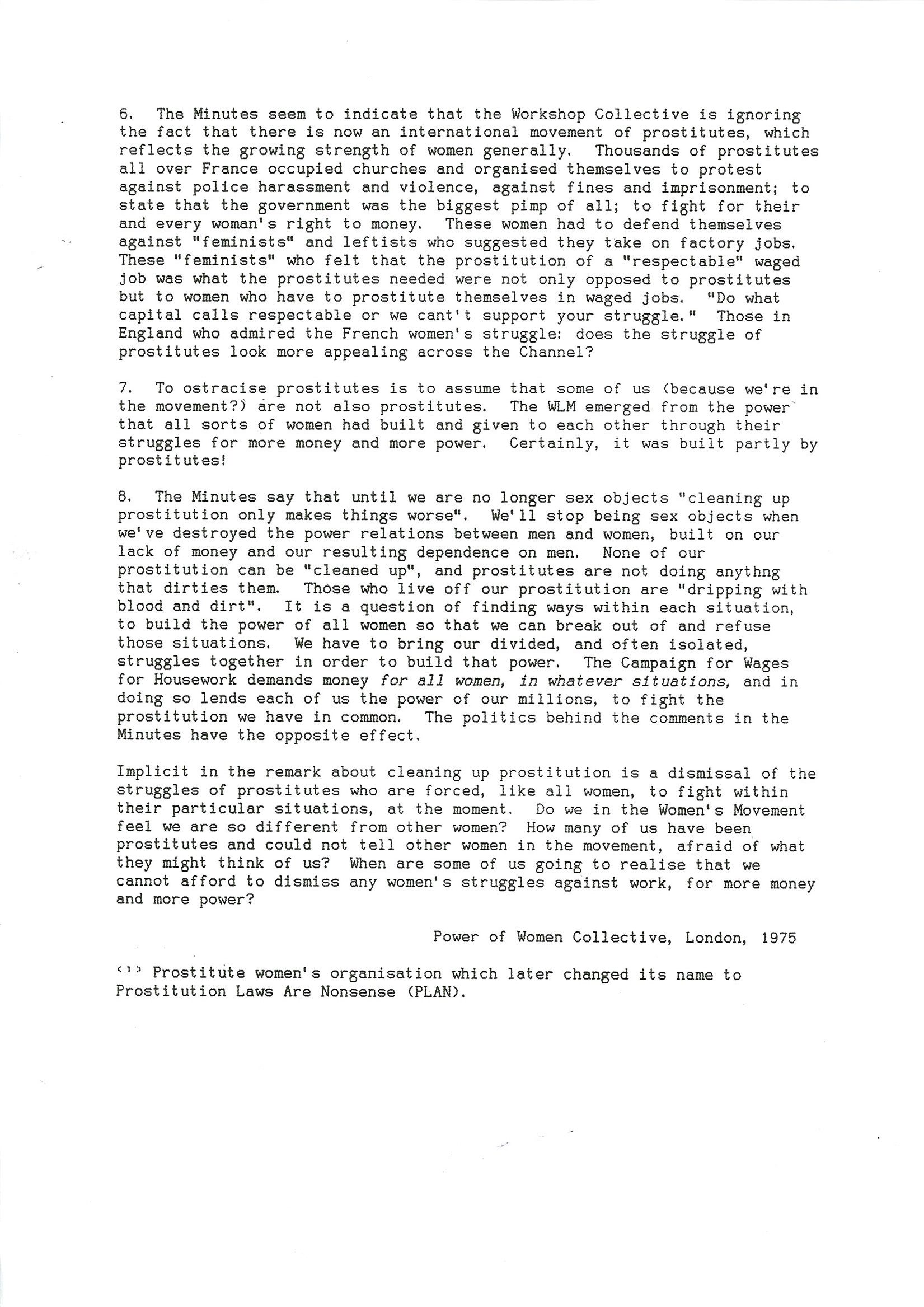Statement: For Prostitutes and Against Prostitution (1975)
DOWNLOAD: For Prostitutes and Against Prostitution



First public statement of what later became the English Collective of Prostitutes.
FOR PROSTITUTES AGAINST PROSTITUTION
In a recent issue of the London Women’s Liberation Workshop Newsletter, the minutes of the Workshop Collective claimed ‘We support prostitutes, but not prostitution’. The eight or so sentences in the minutes on the attitude to prostitutes/ prostitution give the impression that the Workshop Collective has not taken a decision to support prostitutes.
- All work is prostitution, whether we work for money or room and board. All women are prostitutes. Whether we fuck for money, wait on tables, pack biscuits, type letters, drive lorries, bear children, teach in schools, or work in the coal mines, we are forced to sell our bodies and minds. Our whole lives are stolen from us by work.
Most women are partly or wholly dependent on men for food, money, clothes and accommodation. Fucking with those men is part of the work – part of the prostitution – we undergo for this “support”. Even those of us who are not living with men or who have some money of our own can’t escape the definition of ourselves that comes from this universal work and dependence. The jobs and wages we get are determined by the fact that we have no money of our own and desperately need it.
- Official prostitution is not regarded as work, but as some sort of unnatural practise where prostitutes are more or differently degraded than women who work for factories or restaurants or offices. Or the prostitute is seen as depraved, a nymphomaniac or mentally unhinged, or prostitution is regarded as a glamorous and exotic pastime, where the prostitute is escaping from work.
Prostitution is in fact dangerous and hard work, with not very good returns most of the time. The prostitutes who work in the streets in Soho are getting as little as £5 a time (reported in the Evening Standard). There is no guarantee that a prostitute (whether she works in the street or in a nice hotel) will be paid – a lot of men try to get out of paying. Many prostitutes are ostracised by their families, hassled by the law, subject to violence from pimps and police. The fines for soliciting and the penalties for becoming what the law calls “a known prostitute” force women to work for clubs and pimps who take their money, and escort agencies who take the client’s money and leave it to the prostitute to get her money. All prostitutes have had to keep their job a secret from someone. It is usually only the more well-off prostitutes who can afford to think in terms of speaking out in public.
While the laws surrounding prostitution make it very difficult for a woman to go about the job without endangering herself, we don’t think that the solution is to create more laws, more listening rules. Certainly, we do not want to see licensed streets and brothels, where we could be controlled by official pimps instead. AS FAR AS THE LAW IN CONCERNED, WE WANT TO SEE ALL LAWS CONCERNING PROSTITUTION REMOVED. We should not be persecuted, forced by law to work for pimps who take our money; nor should we be forced to pay tax when we are “found out”. No workers should have their wages removed from them by taxation – certainly not women! The only way we can put a stop to prostitution is to put a stop to all women’s work. If we had wages for the work we all do at home we would not have to go out and take on more work to earn money, and would also do less and less housework.
- Hookers or not, lesbian or straight, celibate or “promiscuous”, young or old, married or single, all women benefit from prostitutes’ successful attempts to receive cash for sexual work, because the cash makes it clear that women are working when we are fucking, dressing up, being nice, putting make up on, whenever we relate to men. Prostitutes demystify many aspects of male/ female relationships by showing that there is nothing “natural” about sex being work for money and that it is not therefore in our nature for sex to be work for free either.
Women who have refused to enjoy sex, refused to sleep with some or all men, refused to live with men, refused to be nice to men, have given prostitutes a lot of power. The existence of women who demand payment makes it clear to men that soon they will have to be grateful for anything they get from women. The prostitute, lesbian or “straight”, refuses the unlimited emotional and sexual work (and laundry) that normally accompany relations with men, in favour of a cash demand. Even when prostitutes have been isolated from and ostracised by other women, the struggle of prostitutes has given power to all women. All women benefit when other women in a particular situation make a particular kind of struggle.
- The Minutes say, “There is and must be an alternative to prostitution”. We know the alternatives to prostitution: becoming full-time housewives and marrying leaves us with less money, more work, and less power – and we are still prostitutes. We can take on a waged job, remaining single. This will be, for most of us, as a waitress, nurse, typist, clerk, factory worker or shop girl. We are forced, still, to prostitute our minds and bodies. The wages we get in these jobs are so low that we are forced to beg money from boyfriends and parents, get married, or go on the game.
In every situation we are treated as prostitutes, anyway. On the streets, in our workplaces, in are homes, in pubs – men judge us by our looks, whistle at us, expect us to work – ie. to respond cheerfully, smile, behave the right way. Sexual servicing is so expected from us as a natural thing that men attack us and try to force us to fuck if we resist. Men treat us and see us as prostitutes, as available, because they see that we are doing that work already. Prostitutes are being paid something for this forced labour.
The last “alternative” to all forms of prostitution that exist (ie. all work) is, it would seem, to go and live communally with other women in a squat on £9 a week from the DHSS. Queuing up, begging and in general spending a lot of valuable time dealing with SS forms, snoopers, officials, etc., are a lot of work (for very little money again) and an obvious form of prostitution.
Every alternative to sexual prostitution is either another form of prostitution or terrible poverty or both! To put forward those as alternatives is to support prostitution – not prostitutes. If the minutes reflect a decision of the Workshop Collective, the Collective has taken a position against prostitutes.
- The Minutes say, “Is PUSSI trying to use the movement for its own ends?” Why do the Minutes object to PUSSI “using the movement” and not to the way the left, the trade unions and the State have tried to use our struggles for their own aggrandizement and power, and direct them into channels useful only to themselves – witness NAC (dominated by the male left and MPS), the Working Women’s Charter (trying to make the SLM an auxiliary to the trade unions), “equal opportunities” (declaring the right to do men’s jobs is a liberation!). Why do they pick out PUSSI? Are prostitutes not women? The only purpose of a movement for women’s liberation is to be used by women for women’s ends.
- The Minutes seem to indicate that the Workshop Collective is ignoring the fact that there is now an international movement of prostitutes, which reflects the growing strength of women generally. Thousands of prostitutes all over France occupied churches and organised themselves to protest against police harassment and violence, against fines and imprisonment; to state that the government was the biggest pimp of all; to fight for their and every woman’s right to money. These women had to defend themselves against “feminists” and leftists who suggested they take on factory jobs. These “feminists” who felt that the prostitution of a “respectable” waged job was what the prostitutes needed were not only opposed to prostitutes but to women who have to prostitute themselves in waged jobs. “Do what capital calls respectable or we can’t support your struggle”. Those in England who admired the French women’s struggle: does the struggle of prostitutes look more appealing across the Channel?
- To ostracise prostitutes is to assume that some of us (because we’re in the movement?) are not also prostitutes. The WLM emerged from the power that all sorts of women had built and given to each other through their struggles for more money and power. Certainly, it was built partly by prostitutes!
- The Minutes say that until we are no longer sex objects “cleaning up prostitution only makes things worse”. We’ll stop being sex objects when we’ve destroyed the power relations between men and women, built on our lack of money and our resulting dependence on men. None of our prostitution can be “cleaned up”, and prostitutes are not doing anything that dirties them. Those who live off our prostitution are “dripping with blood and dirt”. It is a question of finding ways within each situation, to build the power of all women so that we can break out of and refuse those situations. We have to bring our divided, and often isolated, struggles together in order to build that power. The Campaign for Wages for Housework demands money for all women, in whatever situations, and in doing so lends each of us the power of our millions, to fight the prostitution we have in common. The politics behind the comments in the Minutes have the opposite effect.
Implicit in the remark about cleaning up prostitution is a dismissal of the struggles of prostitutes who are forced, like all women, to fight within their particular situations, at the moment. Do we in the women’s movement feel we are so different from other women? How many of us have been prostitutes and could not tell other women in the movement, afraid of what they might think of us? When are some of us going to realise that we cannot afford to dismiss any women’s struggles against work, for more money and power?
Power of Women Collective, London, 1975
For later version (1990) please see here. For Prostitutes Against Prostitution
